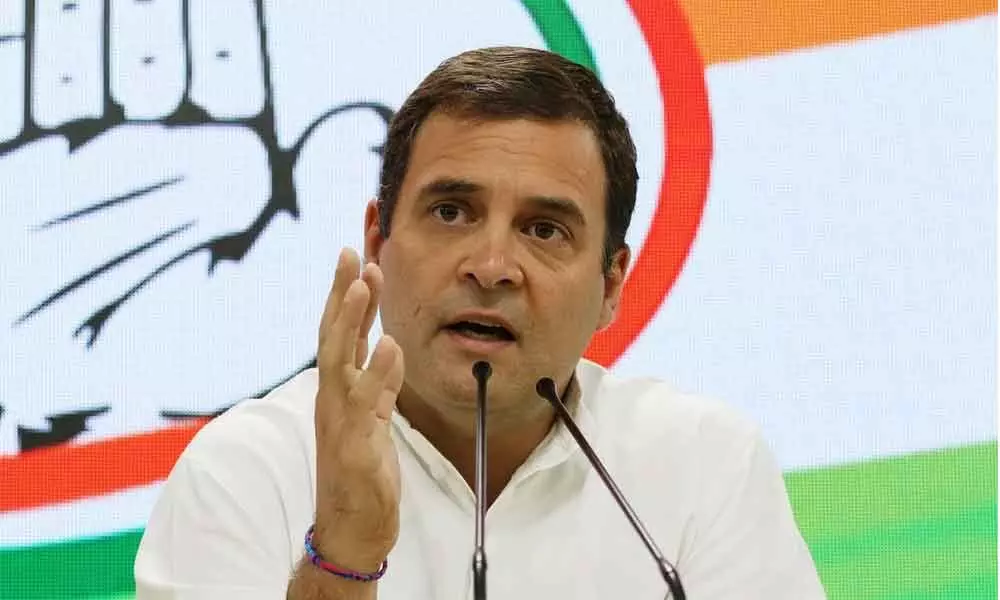Live
- YSRCP stir for MSP today
- Direct flights from Rajahmundry to major cities soon
- Search intensified for Gowtham Reddy as HC dismisses his bail plea
- Santosh Trophy final round to begin in Hyderabad tomorrow
- BGT: Rohit must return to opening for Brisbane Test, says Ponting
- Swimming sensation Havya steals the show
- NDTL gets WADA nod to manage Athlete Biological Passport
- BWF World Tour Finals: Treesa-Gayatri wins 2nd match to keep semis hopes alive
- Youngest ever to conquer chess world
- Jamie Lever to star in Lakshmi R Iyer’s ‘2050’: It challenged me emotionally
Just In
Sadly, DNA of tolerance has disappeared in India, US: Rahul Gandhi


Former Congress chief Rahul Gandhi during his conversation with Professor of Diplomacy at Harvard's Kennedy School, Nicholas Burns, said that the India-US partnership works because both are tolerant nations...
New Delhi: Former Congress chief Rahul Gandhi during his conversation with Professor of Diplomacy at Harvard's Kennedy School, Nicholas Burns, said that the India-US partnership works because both are tolerant nations, but sadly the DNA of tolerance has disappeared in both the countries.
Speaking to the former Ambassador of NATO, Rahul Gandhi said: "I think why our partnership works are because we are tolerant nations. You mentioned an immigrant nation, and we are a very very tolerant nation."
"We are supposed to be open but surprisingly that open DNA is disappearing. I say this with sadness that I don't see the level of tolerance that I used to see. I don't see it in the US and I don't see it in India," the Congress leader said.
Gandhi was responding to Burns, when he described the killing of George Floyd as "horrible" and said that people in the US were protesting over his killing. Floyd died after a police officer pressed his knee against his neck in Minneapolis on May 25 and despite Floyd's plea to let him go he was kept in that position until he lost consciousness and later was declared dead in a hospital.
His last words "I can't breathe" have been a rallying cry for the protesters who have launched demonstrations in various parts of the US. The issue has also led to serious debate in the American society about racial discrimination.
Burns said: "We are protesting and that is our right. And millions of Americans are protesting for our rights the way you have in India. And India and US shares many traits as we both have liberated ourselves from British in different years."
Burns further said that he on many occasions admired the Indian society. "Country sometimes have to go through the political debate like who are we? At the core what kind of nation are we? We are an immigrant nation, we are tolerant nation," the Harvard Professor said.
Burns also admitted that US is in "deep political and existential" crisis that has "gripped us all".
"In the US we have a problem of race of mistreatment of African American, since the first ship of slaves arrived in 1619," Burns said, adding that the US adopted the idea of protesting in non-violent way as was taught by Mahatma Gandhi.
Burns also referred to the American Civil War that fought slavery. "Our greatest, I think American of the last 100 years is Martin Luther King Junior. He fought battles peaceful, nonviolent battles. His of course, you know his ideal was Mahatma Gandhi. He modelled his movement after Gandhi's movement to liberate India from British rule," he said.
"Peaceful non-violence. King Junior led us to become a better country. We elected an African-American President Barack Obama, a man I deeply respect. And yet you see racial debate come back now. You see African Americans mistreated this horrible murder of George Floyd, this young African-American man by police in Minneapolis, Minnesota. We have millions of Americans trying to protest peacefully, as is our right as is your right in India and yet the President treats them all like terrorists," Burns said.
Burns further told Rahul Gandhi that he has identified the central issue at least for the US. "And the silver lining here is, the good news is that we have people demonstrating all across the country, in every major city in the US this week peacefully, on behalf of tolerance, inclusion, minority rights, all these essential issues at the core of our democracy."
"And I think one of the advantages that we democracies have, say over an authoritarian country like China, is that we can correct ourselves. As a self-corrective part of our national DNA, and India and the US," he opined.
He also stressed that like all democracies, we resolve this at the ballot box in free and fair elections. "We do not turn to violence. We do this peacefully. That's the Indian tradition that we love about India from your founding. Yeah, the 1930s, the protest movement, the Salt March all the way to 1947 and 48. So I take... that I can't comment on your country because I don't know it nearly as well, obviously, but my country I think we'll be back. We will be back, we will strengthen our democracy," the Harvard Professor said.
Burns is currently the Professor of Practice of Diplomacy and International Politics at Harvard's John F. Kennedy School of Government.
In the last three months, the Congress leader has interacted with former RBI Governor Raghuram Rajan, Nobel Laureate Abhijeet Banerji, epidemiologist Johan Geseicke and Indian industrialist Rajiv Bajaj.

© 2024 Hyderabad Media House Limited/The Hans India. All rights reserved. Powered by hocalwire.com






